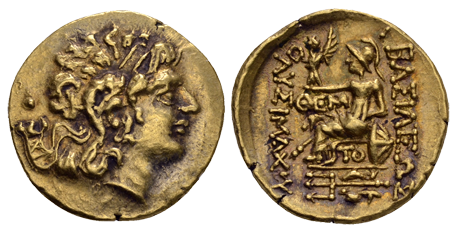When one speaks of something that stands the test of time, then it is still popular, strong, etc. after a long time and continued existence is good as guaranteed. Bitcoin maximalists are convinced that Bitcoin (BTC) has already passed this test with its 14-year existence.
If you compare that with physical gold, which has been used as a medium of exchange and store of value for over 5,000 years and has retained its purchasing power to this day, these 14 years of BTC's existence seem discernibly short by comparison.
Nevertheless, it makes sense to think about whether a cryptocurrency that is intended to serve as a medium of exchange and a store of value even has the prerequisites to stand the test of time like gold. To do this, we need to look at why gold has been used as a medium of exchange and store of value for more than 5,000 years, why it has retained its purchasing power, and what properties it has that have kept it in use for so long..
Gold was and still is used for this purpose, not because it has such a beautiful color, but because it has very specific properties. It is scarce, not arbitrarily multipliable, durable, divisible, transportable, unique, forgery-proof, fungible and anonymous.
If we now take these properties as a reference for cryptocurrencies, it is easy to see that some of these properties are even better represented by BTC than by physical gold. BTC is not only scarce but limited to a maximum of 21 million coins, it is easier to divide and transport than gold, and it is also unique and counterfeit-proof. However, with the properties of fungibility and anonymity, BTC cannot shine compared to gold, and whether it will be long lasting remains to be seen.
Tyrannical structures are taking shape around the world. The globally driven Agenda 2030, dressed up with "sustainability", has at its core the goal of completely abolishing private property. In the future, everyone should be dependent on the state. "You'll own nothing. And you´ll be happy." is the well-known slogan of the WEF of Klaus Schwab.
Property rights today are no longer rights, but concessions dependent on the goodwill of the state. Expropriations (which include taxes, duties and inflation) for the "common good" can be carried out by law at any time. The "common good" is defined by the state as it sees fit.
Today, only those possessions can be called property, of which the state knows nothing and can have no influence on it. Everything else is helplessly exposed to the threat of excessive taxation or even expropriation by the all-powerful state.
In theory, cryptocurrencies are superior to gold as a store of value and medium of exchange in many respects. They are therefore seen by many as the means of choice for withdrawing assets from the fraudulent fiat money system and thus from the arbitrariness of the state (e.g. blocking accounts of disagreeable citizens).
BTC, as the best-known cryptocurrency, is seen by many as a "safe haven", not least because of influential figures such as Michael Saylor, who never tires of spreading meaningless "wisdom" or even verifiable untruths such as "1 BTC = 1 BTC" on Twitter on a daily basis, which serve solely to distract from Bitcoin's weaknesses.
As mentioned above, BTC lacks the fundamental properties of fungibility and anonymity, without which a currency must ultimately fail. "Tainted coins are destructive. If you break fungibility and privacy, you break the currency." Andreas Antonopoulos
For those unfamiliar with the term, fungibility is about the interchangeability of individual units of a good. All BTCs and their subunits (sats) are uniquely identifiable and assignable to individual transactions. BTCs involved in illegal transactions can therefore be identified, traced and blacklisted ("tainted coins").
These coins can already be detected at the mining level and excluded from further processing. If tainted coins appear on an exchange, they are frozen or confiscated there. Freshly mined BTC are traded at a premium due to the non-existent transaction history. BTC is not fungible and can never be made so. Those who claim otherwise either don't know any better or are doing so out of dishonest self-interest.
Anonymity will gain overproportional importance in the next few years due to the above-mentioned Agenda 2030. BTC can no longer be acquired anonymously today without the risk of getting tainted coins. One is only safe on centralized exchanges (CEX) with KYC that routinely scan incoming BTCs. Once a person's BTC wallet address is known, the entire transaction history and wallet contents can be viewed. Companies specializing in BTC forensics, such as Chainlink, Cyphertrace, Palantir and others, can reveal all the connections stored on the blockchain of all transactions ever made.
Work is being done feverishly by developers to create anonymity for BTC. Since all coins remain uniquely identifiable, mixers are often used by Bitcoiner’s trying to maintain financial privacy [or anonymity].. However, the drawbacks to mixing on BTC comes with additional fees of 1-3%, and even the popular mixer Wasabi has decided to censor certain transactions. Blender.io, another mixing service, was sanctioned by the US Treasury department for aiding DPRK state sponsored hackers in laundering stolen funds..
The message could not be clearer. Every BTC transaction has to remain transparent and fully monitorable by the state. This must be seen in connection with the Agenda 2030. One does not want to allow assets to accumulate on a decentralized, unconfiscable and unstoppable blockchain without being able to determine who owns what. Once the identity of a wallet has been established, it is irrelevant whether or not third parties have direct access to these assets. The state has ways and means to force every citizen to hand over his assets.
Anonymity and fungibility are only the two most important features BTC lacks. The list is long. For those who would like to get a better picture of what characteristics superior money must have, please refer to the interactive pdf "The Quest For Superior Money", or the video series on it by Uncle Vigilante "The Quest For Superior Money with Todd Lewis".
Going into more detail about the Lightning network, which is supposed to fix the poor scalability, high transaction cost and even lack of anonymity of BTC, is beyond the scope of this article. But if you want to see for yourself the disastrous state of the Lightning Network, check out the long list of technical problems, bugs, errors, criticisms and exploits here.
Bitcoin has not yet passed the test of time. The biggest hurdle is yet to come when the out-of-control state wants to appropriate citizens' digital assets. Only a cryptocurrency like Epic Cash, which is anonymous at the base layer and also outperforms Bitcoin in key areas such as scaling, speed, decentralization, mining capability, cost, and much more, can pass this coming test.
For more information, please visit EpicCash.com
If you want to take a closer look at Bitcoin's DNA and how Bitcoin was originally supposed to be, you can find more here.







Great article I've reposted it here.
https://fakeologist.com/donate/epic-info/